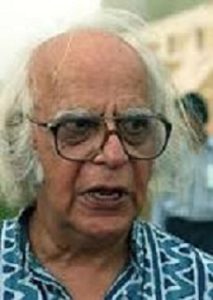Famous Indian scientist Professor Yash Pal died on Monday. He was 90 years of age and was living in Noida, Uttar Pradesh. His last rites will take place at 3 pm on Tuesday.
Professor Yash Pal was a scientist of international repute, and received Padma Bhushan in 1976. In 2013, he was awarded Padma Vibhushan for his contribution in the field of science and technology. He also received prestigious Indira Gandhi Prize for Popularization of Science in 2000, and The Meghnad Saha Medal in 2006.

Professor Yash Pal was born on 26 November 1926 in the small town of Jhang that is now part of Pakistan. He spent his childhood days in Pai, Kaithal, Haryana (India). He graduated with a master’s degree in physics from Panjab University in 1949.He completed his Doctor in Philosophy (PhD) degree from Massachusetts Institute of Technology in 1958. It was MIT where he specialized in subjects of high-energy physics, astrophysics, communication, science policy and space technology.
Professor Yash Pal started his career as a member of the Cosmic Rays group in Tata Institute of Fundamental Research (TIFR), Bombay. Then he moved to MIT for his PhD degree. After returning to India, he was associated with TIFR again and remained associated with it until 1983.
In 1973, he was appointed as the first Director of the newly set up Space Applications Centre, Ahmedabad.
During his career, Professor Yashpal focused on the study of cosmic rays, astrophysics and development, high-energy physics, among others.
He served at the following posts:
– – – Professor, Tata Institute of Fundamental Research, Mumbai;
– – Director, Space Applications, Centre, Ahmedabad (1973-81);
– – Chief Consultant, Planning Commission (1983-84);
– – Secretary, Department of Science and Technology (1984-86)
– – Chairman, University Grants Commission (1986-91), New Delhi.
He was appointed as the Chancellor of Jawaharlal Nehru University, New Delhi in 2007 and served till 2012.
Pal’s contribution and involvement in school education dates back to the early 1970s with the pathbreaking Hoshangabad Science Teaching Program. In 1993, he was appointed as the chairman of National Advisory Committee set up by the Ministry of Human Resource Development (MHRD), Government of India. The committee looked at the problem of overburdening of school children. The committee gave its report entitled “Learning without Burden”, discussing the changes that are required to make education a burden-free affair for the students.
